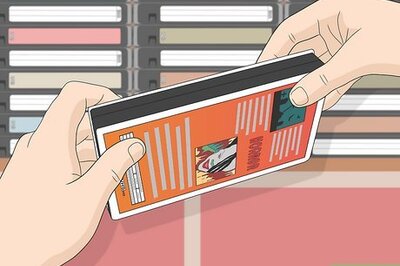
views
Thank You for Your Time Meaning & Usage
It means you are grateful for the time someone spent assisting you. This is a phrase that’s most commonly used in business settings to express your gratitude when another person has spent time helping you. It acknowledges that the other person has taken time out of their day in a way that benefits you. The time is usually used to provide direct help with a task or information. It also refers to a discussion that benefits the speaker, like an interview or meeting that kicks off a new project.
Use it in spoken or written communication in professional settings. Keep your message short (1-2 lines) while being sincere in your appreciation. Etiquette Coach Tami Claytor says, “If it's for a job interview or business interview, you can say, ‘Thank you for your time.’ And that's really the meat and bones of it. Of course, you can add additional information such as, ‘I enjoyed speaking with you.’” Other times when “thank you for your time” may be appropriate are: To say “thank you” after an interview. Thanking someone in your network for job referrals or recommendations. Offering thanks to someone who volunteered to help with an event for a nonprofit organization. Showing gratitude to a mentor during an internship.
Be aware that “thank you for your time” may be seen as formulaic. Avoid this by being as specific as possible when thanking someone for their time. Personalize your message by stating how the other person helped you and how that help impacted you. It can also be helpful to offer a small token of appreciation, such as flowers, cookies, or a gift card for coffee. Here are some examples of how to make “thank you for your time” seem less formulaic: “I appreciate your time and attention in helping me clear up the accounting error.” “I wanted to express my gratitude for taking the time to speak with me about the open position.” “Many thanks for giving me your time during the inventory process.” “I am grateful for the time you invested in this project.” “I am so thankful for your time and effort in getting the budget proposal ready.” “Thank you for generously giving me your time this week.” “I truly value the time you spent helping me prepare for my presentation.” “Please accept my sincere appreciation for your time and hard work to update the product images on the website.” “Allow me to extend my sincere gratitude for the time you spent checking for errors in the text.” “I appreciate you taking the time to meet with me about catering our upcoming event.” “Thank you for spending time finding the answer to the client’s questions today.” “Your time is valuable, and I am grateful you shared it with me this week.” “I am so thankful for the time you've given me today.” “Your time is much appreciated. Your help made this report so much better.” “Thank you for generously sharing your time with me. I would never have gotten the design finished on time without you.” “I'm grateful for your time and attention on this matter.” “Thank you for investing your time in our conversation about personal development opportunities.” “I appreciate the opportunity to spend time with you learning the tasks of my new role. You’ve been a huge help.”
Other Similar Phrases
Other phrases may be more appropriate in some situations. “Thank you for your time” is a great place to start, but it may not be appropriate for every situation. Or, it would be more appropriate to highlight the type of help offered, such as support, great work, consideration, or an opportunity. Here are a few examples of ways to thank another person in a business setting: “Your help is greatly appreciated.” “Thank you for all the help!” “I wanted to express my gratitude for your help and support today.” “Your support means the world to me!” “I’m forever indebted to you for your support.” “Thank you for a job well done.” “You continue to exceed my expectations — thank you for the hard work you put into everything.” “My special thanks to you for doing a great job on the project.” “I applaud you for your excellent work this week.” “I would like to extend my gratitude to you all for your excellent work.” “Thank you for consistently delivering outstanding results!” “Thank you for considering my request.” “I appreciate your taking the time to consider my application.” “My deepest thanks for your consideration.” “I greatly appreciate your thoughtful consideration.” “I cannot express how grateful I am for this opportunity.” “Many thanks for giving me the opportunity.” “This opportunity has been a blessing for me — thank you from the bottom of my heart!” “I can’t thank you enough for this opportunity.” “I cannot stress enough how much this opportunity means to me.”
Why say “thank you for your time”?
Politely showing appreciation builds strong work relationships. Using this simple phrase is a common courtesy, but it makes a lasting impact on your career and work relationships. People are busy, and it’s polite to show you appreciate them. It also helps you develop professionalism and opens the door for future collaboration. Saying “thank you for your time” helps you foster communication and build your professional network because people are more inclined to help someone who appreciates their efforts. Plus, expressing your gratitude at work helps boost your well-being, reduce stress, and improve job satisfaction.
How to Say “Thank You” Professionally
Be quick, genuine, and specific when thanking a colleague. Whether a colleague offers valuable advice or gives you a heads-up about a new opportunity, it’s important to let them know how much you appreciate their help, even when “thank you for your time” isn’t the appropriate phrase. Make sure you thank the other person right away when they help you. When choosing your words, try to be genuine in your appreciation and specific about the help they gave you. Here are a few ways to professionally say “thank you” in a business setting without mentioning the time a person took: “Thank you for your valuable advice.” “Thank you for taking the time to speak with me.” “I am grateful for your valuable insight.” “I truly appreciate the advice you gave me.” “Your advice has been most helpful — thank you!” “I’m beyond grateful for your advice.” “I appreciate the advice you have shared.” “Thank you for sharing your thoughts with me.” “Thank you for considering my application.” “I’m very pleased to have you as part of my network.”




















Comments
0 comment